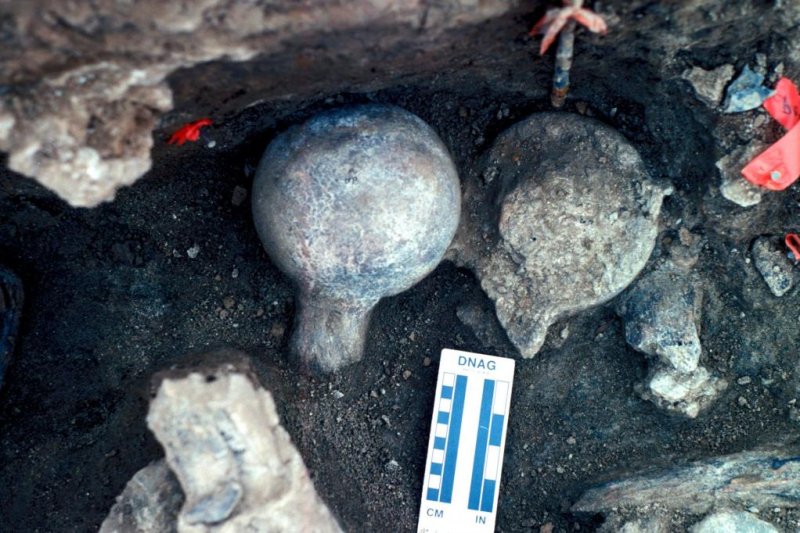A pair of mastodon femur balls are seen at the archaeological dig site in San Diego, where scientists claim to have found evidence of early human activity. Photo by the San Diego Natural History Museum
April 27 (UPI) -- According to a new study, early humans were in what is now California about 130,000 years ago.
The alleged archaeological site is more than 100,000 years older than what most scientists believed to be the earliest signs of human presence in the Americas.
"I realize that 130,000 years is a really old date and makes our site the oldest archaeological site in the Americas," lead researcher Tom Deméré, the paleontologist at the San Diego Natural History Museum, told National Geographic. "Of course, extraordinary claims like this require extraordinary evidence, and we feel like the Cerutti mastodon site presents this evidence."
The evidence does not include human remains. Deméré and his colleagues argue the dig site in San Diego County contains stone flakes and deliberately smashed mastodon bones.
In their new paper, published this week in the journal Nature, researchers argue early human relatives -- perhaps, Neanderthals -- used stone hammers to smash elephant bones at the site between 120,000 and 140,000 years ago.
The claims have quickly sparked controversy.
"The earliest occupation of the Americas is a highly contentious subject," said John McNabb, an archaeologist from the University of Southampton. "The date of the find at 130,000 years ago is a really big ask for archaeologists who are used to talking about 12, 13, 14,000 years ago. It's a big, big time difference."
The bones were first discovered in 1992 by construction workers preparing to build California's State Route 54. The site was quickly roped off for an emergency excavation.
Scientists were puzzled by the mastodon bones, which were smashed and unusually arranged beside rounded stones. Researchers smashed elephant bones in Tanzania with stone hammers to see if the act might explain the odd fragments. The resulting bone fragments looked just like what they'd found in California.
Other scientists mostly agree with the dating technique used to determine the age of the mastodon bones. But many believe the evidence is not conclusive enough to back up such a significant claim.
"I was astonished, not because it is so good but because it is so bad," Donald K. Grayson, an archaeologist at the University of Washington, told the New York Times.
Most of the criticism is the same: Deméré failed to consider less extraordinary explanations for the smashed state of the ancient bones.
"They present evidence that the broken stones and bones could have been broken by humans," said Vance T. Holliday, an archaeologist at the University of Arizona. "But they don't demonstrate that they could only be broken by humans."
Genomic analysis suggests modern humans didn't leave Africa until 50,000 to 80,000 years ago, but Neanderthals and their relatives left Africa several hundred thousand years ago, migrating as far as Siberia.
One recent study showed bison traveled from Asia to North America across the Bering Land Bridge roughly 135,000 years ago. If bison could do it, Deméré argues, humans could, too.
"Some people are just going to say it's impossible and turn away," Deméré said. "We could be wrong. But people have to be open to the possibility that humans were here this long ago."















